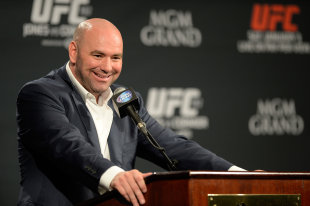LAS VEGAS – Dana White is a visionary, an unquestionably driven and creative man who has shown a willingness to go to almost any length to get what he wants.
He’s battled friends and friended enemies as he’s led a dying company in an almost non-existent sport into mainstream status.
He was a 31-year-old without much money and no track record of business success when he took over as UFC president in January 2001, when he and partners Frank and Lorenzo Fertitta paid $2 million to purchase the company from Semaphore Entertainment Group.
Mixed martial arts was a mess in 2001 and was only sanctioned by New Jersey at the time of Zuffa’s purchase. It was ignored by the mainstream media, unavailable on television except on pay-per-view and had a tiny (though committed) fan base.
More than 15 years later, the sport is legal and sanctioned in all 50 states. Since White took over, the UFC has put on shows in 21 countries and in 30 states.
It has offices in Las Vegas, Toronto, London, Sao Paolo and Singapore. CEO Lorenzo Fertitta told CNN that the company had $600 million in revenues in 2015.
It has a network television contract with Fox, is covered by a dedicated corps of media that reports on even the most minor roster moves and a fan base so eager for content that the UFC has created an online streaming service to help satisfy the demand.
Competitors have come and gone, the most significant of them purchased by the UFC. Its current chief competitor is Bellator MMA, which is owned by the powerful media giant Viacom.
The New York Times reported in 2013 that Viacom paid $50 million for Bellator in 2011. It is inconceivable that it would have paid $50,000 for it in January 2001 when it seemed that White stood alone in a world of billions singing the praises (and the prospects) of MMA.
Now, according to numerous media reports, the UFC is for sale and bids are at or above $4 billion. That would represent about a 200,000 percent increase from the $2 million that White and the Fertittas paid for it.
Zuffa has not acknowledged the reports, and White has largely gone incommunicado with the media in the last few months. But multiple reports say the bidders, who are looking to purchase 100 percent of the company, want to keep White on to run it.
No one understands the business and what it takes to succeed quite as well as White. The fight game is vastly different than any other, and while White would probably fail miserably running an oil company or a technology firm, he is uniquely qualified to run the UFC.
It’s not that someone can’t take what White has built and keep the ship afloat, but buying the UFC without White is not substantially different than purchasing Coca-Cola and not getting the secret formula with it.
Boxing’s Don King has long been dubbed “The World’s Greatest Promoter,” but if truth be told, he long ago ceded that honor to White.
Part of White’s success has been the sheer force of his will. Much of the UFC’s appeal to potential buyers is that the talent cost is low relative to other professional sports.
And that’s where White’s ruthlessness has held the line. He has not been afraid to sever relationships with even his greatest fighters. He’s battled managers, faced down lawsuits and taken on media who dared to ask why fighters weren’t earning more.
He's fought fiercely to keep fighter purses and other business information like revenue, profit/loss and pay-per-view sales a secret. Information is power and White has kept a tight rein on the UFC’s financial data.
At the same time, he’s been a tireless advocate for the sport. He worked stunningly long hours, traveling the world to explain the basics of MMA to anyone who would listen. In the early days, not that many wanted to hear what he had to say, but it never deterred him.
He was patient, even as the financial losses mounted in those first few years. He believed fully in the product and insisted repeatedly that it someday would become the biggest sport in the world.
That’s long been the domain of soccer, but when White was challenged on it, he would say, “Fighting is in our DNA."
Love him or loathe him, the 46-year-old president of the UFC is far and away the most important figure in the brief history of MMA.
His influence is felt across the sport, from the way the fights are contested to the way they’re presented on television.
White is no fan of a conservative, take-no-risks style of fighting. He encourages the fighters passionately to go for the finish, to eschew a game plan, to forget about risk and to put an exciting match above all else.
He’s motivated fighters to use the style he enjoys by paying the ones who do and by cutting the ones who don’t. Entering a Feb. 6 fight against Roy Nelson, heavyweight Jared Rosholt had won three in a row and six of seven in the UFC.
His style, though, was that conservative one that White so loathed. After Nelson won a decision that night in a bout that was panned by fans and critics alike, White told Yahoo Sports, “That fight set the sport back 10 years.”
Shortly thereafter, Rosholt was cut, out of a job despite a 6-2 record. It’s far from the first time White has done something to that effect – a not-so-subtle way of reminding fighters what they need to do to keep their jobs.
That style of fights has led in part to a great expansion of the fan base. The UFC’s marketing and public relations teams were, over time, able to show that MMA wasn’t, as Sen. John McCain (R-Ariz.) infamously called it in 1997 “human cockfighting.”
It was a legitimate sport that combined many sports that are in the Olympics, such as boxing, wrestling, judo and taekwondo, but in the early days, that was lost on many people. It wasn’t the kind of thing that would end civilization, but it was incredibly entertaining. The problem was that at the time White took control, too few people understood what the sport was.
The UFC’s clever marketing, public relations and business acumen all play a role in the company’s success, but without the crazy knockouts, violent slugfests and out-of-nowhere submissions, it wouldn’t be near where it is today.
That will be difficult to replace without White constantly pushing the fighters to perform, and it’s an integral part of the success.
He vowed upon taking control of the UFC that any fan who wanted a picture or an autograph with a fighter would get one. He led the way in this regard himself, sometimes standing in the same spot for hours at a time signing autographs. He would agree to crazy requests from fans, allowing them to make a ring walk with a fighter or to wrap the belt around a champion’s waist after a big win.
His temper has gotten the best of him at times, and he’s taunted fans via social media, battled with and yanked credentials from reporters and openly blasted referees and judges.
The sport would be dramatically different without him, in some ways for the better and in other ways for the worse.
If the UFC is indeed sold and White opts not to stick around, one thing is for certain: It’s going to be a lot less colorful and a lot less entertaining to be around the UFC on a day-to-day basis.






























